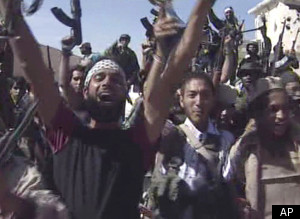The Chateau was very elegant. It was impressive without being ostentatious. As I got out of the car and took a look at it, I thought it was worth making the long trip from the U.S. to Meru, France, a picturesque hamlet outside Paris, to learn and teach in such a beautiful venue. I was there, with one of my graduate students, to participate in an international conference on the Arab Spring.
Initially as Tunisia and Egypt became free from their dictators through massive, peaceful and clearly pro-freedom protests, a sense of euphoria was unleashed in the Arab world and elsewhere that finally the much desired and awaited change was coming to the Middle East. But as the scene shifted from Tunis and Cairo to Libya, Yemen and Syria, the images of freedom triumphant were replaced with those of civil war and brutal repression. Optimism has been delivered a severe blow and has been replaced with mixed emotions and caution.
As history unfolds itself across the Arab World, observers of the region are compelled to take a more closer and nuanced view of the events, since it is apparent that the complexity of change is confounding both advocates and cynics. The conference in France was a great opportunity to reflect on several key issues such as prospects for democracy, the rise of Islamists and the socio-political conditions that were propelling and shaping change.
The conference was organized by theInstitute for Religion, Culture and Politics of Washington College in Maryland. Both the content and the structure of the conference were illuminating. The conference essentially brought professors, graduate students and undergraduate students from University of Delaware and Washington College in the U.S., Oxford University in UK, Al-Akhwayn University in Morocco, De La Salle College in Philippines, to share their ongoing research on the transformations in the Arab World and its global implications.
It was an interesting experience. We were sharing research findings while at the same time teaching and mentoring young scholars.
One of the intellectual challenges that we discussed was how to classify what was happening in Egypt and Tunisia. Where they popular revolutions, or regime changes or coups? There is definitely a promise of fundamental political transformation — from oligopolistic dictatorships to electoral democracies. But as one observes, especially Egypt, one realizes that economic and security conditions have declined and the army like in the era of the dictator Hosni Mubarak still holds sway. So what really transpired? Was this a carefully orchestrated military coup against Mubarak or a spontaneous cry for democracy?
The clashes and tension betweenMuslims and Christians and the growing influence of Salafi Muslim groups, whose leadership does not believe in either democracy or equality was clearly of concern to many of the participants. Those who are following the discourses in Tunisia and Egypt closely nevertheless brought a lot of hope and intellectual excitement to the forum. The emergence of competing sophisticated narratives that explored ideas like the civil state and the Islamic state in Egypt, the appropriation of the language of human rights and advocacy for freedoms by the women activists of Islamic movements in Tunisia were some of the themes explored in several panels.
Needless to say the role of Islam in the public sphere was one of the most discussed topics. In my remarks, I observed that both al Qaeda and the Muslim Brotherhood in Egypt and al-Nahda in Tunisia played no role in either inspiring the revolutions or in the leadership that guided them. Indeed it is now established that they did not even anticipate what was coming. To me, this was a fascinating indication of the extent to which both moderate and extremist Islamic groups were out of touch from the mainstream of their own societies, particularly with the educated youth who were the main engines of change in Egypt and Tunisia. The revolutions appeared clearly to indicate that the silent majority had finally awakened.
But after the revolutions, the transition period is clearly dominated by Islamic parties in Egypt and Tunisia. They are well-organized entities, they have a long-standing support structures and dedicated following, and a gamut of ideas that touch the core identity of Arab Muslims. They are good at using symbolic politics to manipulate the religious sentiments of the people. Most participants at the conference expressed the view that while hopefully democratic regimes will emerge in the region eventually, they will however be shaped and defined by Islamic values and ethics and Islamic movements would play a prominent role in the region’s future.
Clearly the first hand reports from those who had visited the region after the uprisings were priceless. They allowed us to understand the developments beyond the limited view allowed by journalistic reports. But the observations and insights from faculty of different disciplines as they tried to make sense of the transformational politics by comparing them to other transitions in Eastern Europe and Latin America, provided invaluable depth to the discussions.
But what was most interesting about the conference was listening to the youthful undergraduates and seeing the world through their lenses.
Dr. Muqtedar Khan is Associate Professor at the University of Delaware and a Fellow of the Institute for Social Policy and Understanding. His website iswww.ijtihad.org.







